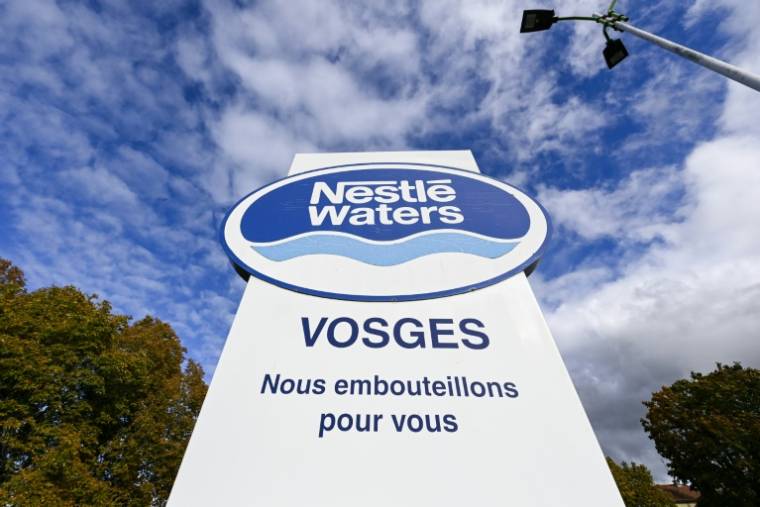Part of the production of the Perrier brand, a subsidiary of Nestlé, was destroyed “as a precaution” after the discovery of bacteria of “faecal origin” in one of its boreholes (AFP / Fabrice COFFRINI)
Groundwater intended for mineral water bottles is not safe from external contamination: part of the production of the Perrier brand, a subsidiary of Nestlé, was destroyed “as a precaution” after the discovery of bacteria ” of fecal origin” in one of its boreholes.
The prefect of Gard has given notice to the company to “immediately suspend” the operation of one of its water catchments in Vergèze, in a decree dated April 19 consulted on Wednesday by AFP.
It is indicated that this catchment “presented an episode of contamination from March 10, 2024 and over several days by germs witnessing contamination of fecal origin (coliforms, Escherichia coli) but also by germs of the species Pseudomonas aeruginosa.
It is also underlined “that contamination of packaged water (finished products) from this drilling (…) cannot be excluded (…) and may pose a risk to the health of consumers”.
On Wednesday, Nestlé Waters France, a subsidiary of the world leader in the food industry, announced to AFP that it had, “as a precaution”, destroyed “several batches of bottles”, the equivalent of “several hundred pallets” usually delivered in store.
She assured that “all bottles on the market are safe to consume.”
Nestlé Waters limited itself to mentioning a “punctual microbiological deviation” which appeared following “the very heavy rains linked to a recent Mediterranean type event in the Gard”, the storm Monica which hit the south-east of France during the weekend of March 10.
The company has not quantified the loss of production. “Certain references” of the Perrier brand, created in 1903, will be available “in smaller quantities”, the same source simply indicated.
Questioned by AFP, Olivier Almeras, CGT representative of the Vergèze source, estimated that the destruction could involve around forty million bottles out of a stock of 1.4 billion.
“To date, there are no consequences on activity and employment according to our management,” added the trade unionist.
– Contaminations that may be repeated –
Operation of the well concerned can only resume by fulfilling a series of conditions, according to the prefectural decree, in particular the search and “removal” of sources of contamination.

The Nestlé Waters logo on its Vittel bottling site, in the Vosges, October 24, 2023 (AFP / JEAN-CHRISTOPHE VERHAEGEN)
The mineral producer, also owner in France of the Vittel, Contrex and Hépar brands, has been under pressure since the end of January, when it publicly admitted having used prohibited treatments for mineral water (disinfection by UV lamp, filtration on activated carbon, in particular ), in order to guarantee risk-free consumption.
The group had recognized this practice in 2021 to the French authorities who subsequently decided to authorize certain micro-filters, revealed the newspaper Le Monde and Radio France.
These media then revealed at the beginning of April a note from the French health agency Anses recommending “reinforced surveillance” of the Swiss giant’s water catchment sites due to “an insufficient level of confidence” in “the evaluation of the quality of resources.
Nestlé subsequently assured AFP that it had “intensified surveillance” of its French drilling “under the control of the authorities”. Some wells were suspended last year in the Vosges.
Concerning the Vergèze site, a letter from the regional health agency dated June 2023, consulted by AFP, noted that the operator was faced with “regular bacteriological contamination of raw water, particularly after rainy episodes , on at least five of the seven authorized drillings. The document mentions bacteria present in feces, such as E.coli.
The decree of the prefect of Gard notes that the suspended well had “already been the subject of previous bacteriological contamination following rainy episodes of the Mediterranean type”. And that such events “are likely to recur both in frequency and intensity”.
To continue to exploit drillings with degraded quality, Nestlé Waters has created a new brand, “Maison Perrier”, which produces drinks that have received drinking treatment, and therefore sold without the mineral water label.
On April 11, the Senate launched a parliamentary fact-finding mission which intends to “shed light on the state’s failures” in terms of controlling bottled water manufacturers.
“Ore carriers face real challenges in a context of global warming: the (water) tables no longer recharge in the same way, there are external contaminants,” hydrologist Emma Haziza told AFP. , at the time of the first revelations.
